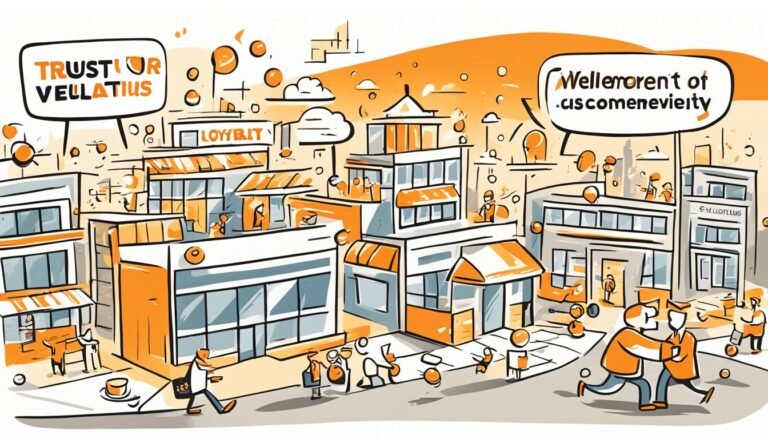Unlock Consultative Selling Psychology Secrets
Welcome to our in-depth exploration of consultative selling psychology. In today’s increasingly customer-centric marketplace, cultivating strong relationships and understanding the needs of your customers is vital for sales success. Consultative selling psychology provides the key to unlocking those secrets.
Consultative selling goes beyond traditional sales tactics by prioritizing open dialogue, active listening, and personalized solutions. By understanding and implementing the principles of consultative selling psychology, you can effectively connect with your customers and provide tailored solutions that meet their specific needs.
Key Takeaways:
- Consultative selling prioritizes relationships and open dialogue to meet customer needs.
- Active listening, asking the right questions, and personalized solutions are key principles of consultative selling.
- Pre-call planning, post-meeting follow-up, and building long-term relationships are part of the consultative selling process.
- AI and buyer psychology are shaping the future of consultative selling.
- Incorporating principles like Maslow’s Hierarchy of Needs and leveraging emotional factors can enhance consultative selling.
What is Consultative Selling?
Consultative selling is a personalized, customer-centric sales approach that focuses on establishing trust, understanding the customer’s situation, and providing tailored solutions. Unlike traditional transactional selling, consultative selling prioritizes building relationships and creating value for both the customer and the seller. By actively listening to the customer’s needs and asking the right questions, consultative sellers gain a holistic understanding of the customer’s unique challenges and objectives. This enables them to position the value of their product or service over its price, highlighting how it addresses the customer’s specific needs and delivers tangible benefits.
At the core of consultative selling is the belief that every customer is unique and has distinct requirements. Rather than following a one-size-fits-all approach, consultative sellers provide personalized solutions that align with the customer’s needs and goals. By taking the time to understand the customer’s business, industry, pain points, and aspirations, consultative sellers can tailor their offerings to create maximum value. This consultative sales approach not only enhances customer satisfaction but also builds long-term relationships based on trust and mutual success.
To illustrate the concept of consultative selling, let’s consider an example in the B2B software industry. A consultative seller, let’s call him Mark, engages with a potential customer, XYZ Corporation. Before the sales meeting, Mark thoroughly researches XYZ Corporation’s specific challenges, industry trends, and competitors. During the meeting, Mark actively listens to XYZ Corporation’s needs and pain points, asking relevant questions to gain deeper insights. He then positions his software solution as the answer to XYZ Corporation’s challenges, highlighting how it can streamline their processes, increase efficiency, and boost their bottom line.
“At XYZ Corporation, we understand the unique needs and objectives of our customers. By taking a consultative approach, we can provide customized solutions that address their pain points and create long-term value. Our software solution has been designed to specifically meet the challenges faced by companies in the industry, streamlining processes and driving growth.”
By focusing on the customer’s needs and creating value through personalized solutions, consultative selling leads to more successful sales outcomes and establishes a stronger bond between the customer and the seller. This customer-centric approach is especially effective in industries where the buyer’s journey is complex, and the decision-making process involves multiple stakeholders. Through consultative selling, sellers can differentiate themselves from the competition, build trust, and ultimately drive revenue growth.
Next, we will explore the key principles of consultative selling and how they contribute to a successful sales strategy.
Key Principles of Consultative Selling
Consultative selling requires a strategic approach that focuses on building strong relationships, understanding customer needs, and providing personalized solutions. By applying key principles such as active listening, asking the right questions, positioning value over price, and offering personalized solutions, sales professionals can effectively engage with customers and drive successful sales outcomes.
Active Listening
In consultative selling, active listening plays a crucial role. It involves fully engaging in the conversation with the customer, demonstrating genuine interest, and listening attentively to understand their needs, challenges, and goals. By actively listening, sales professionals gain valuable insights that allow them to tailor their approach and offer relevant solutions that address specific customer pain points.
Asking the Right Questions
Asking the right questions is another key principle of consultative selling. By asking open-ended and probing questions, sales professionals can uncover the customer’s motivations, preferences, and desired outcomes. These questions go beyond surface-level information and delve deeper into the customer’s needs, allowing the salesperson to provide more targeted and effective solutions.
Positioning Value over Price
In consultative selling, the focus is not solely on the price of the product or service but rather on the value it brings to the customer. Sales professionals should emphasize the benefits and unique features of their offering, clearly articulating how it can solve the customer’s problems and meet their specific needs. By positioning value over price, sales professionals can build a compelling case for the product or service, making it more likely that the customer will see it as a worthwhile investment.
Personalized Solutions
Personalization is a key principle that sets consultative selling apart from traditional sales approaches. By understanding the customer’s individual needs, challenges, and goals, sales professionals can tailor their solutions to match their specific requirements. This personalized approach demonstrates a genuine understanding of the customer’s unique circumstances and creates a stronger connection, increasing the likelihood of a successful sale.
By applying these key principles, sales professionals can effectively engage in consultative selling, building trust and rapport with customers, and delivering solutions that truly meet their needs.
| Key Principles | Description |
|---|---|
| Active Listening | Fully engaging in the conversation and attentively listening to the customer’s needs, challenges, and goals. |
| Asking the Right Questions | Probing and open-ended questions that uncover the customer’s motivations and desired outcomes. |
| Positioning Value over Price | Emphasizing the benefits and unique features of the product or service, focusing on its value to the customer. |
| Personalized Solutions | Tailoring solutions to match the specific needs, challenges, and goals of each customer. |
The Art of Consultative Selling
The art of consultative selling involves several key steps that contribute to building strong customer relationships and driving sales success. By understanding and implementing these steps, sales professionals can effectively engage with customers, identify their needs, and provide tailored solutions.
Pre-Call Planning
Prior to a sales meeting, pre-call planning plays a crucial role in preparing for meaningful interactions. It requires gathering information about the customer’s specific needs, challenges, and goals. This knowledge empowers the salesperson to have a targeted and productive conversation during the sales meeting. It also demonstrates to the customer that the salesperson values their business and is committed to understanding their unique circumstances.
Sales Meeting
The sales meeting is the core interaction where consultative selling skills come into play. It is essential to prioritize active listening, allowing the customer to express their pain points, challenges, and aspirations. By asking the right questions and showing genuine interest, sales professionals can uncover valuable insights and demonstrate their commitment to understanding the customer’s needs. This collaborative approach builds trust and lays the foundation for providing effective solutions.
Post-Meeting Follow-Up
After the sales meeting, it is crucial to follow up promptly and consistently. This includes sending a thoughtful thank-you note to express gratitude for the customer’s time and engagement. Additionally, summarizing the key points discussed and outlining the agreed-upon next steps helps maintain momentum and clarity. Adequate post-meeting follow-up is an opportunity to showcase professionalism and reinforce the customer’s confidence in the salesperson and their solutions.
Building Long-Term Relationships
Building long-term relationships is a fundamental aspect of consultative selling that goes beyond individual transactions. Sales professionals should aim to stay in touch with customers, providing ongoing support and value even after the sale is made. Continuously seeking opportunities to exceed expectations, offering additional resources, and demonstrating a commitment to the customer’s success helps nurture trust and foster loyalty. By consistently building long-term relationships, sales professionals position themselves as trusted advisors and partners.
| Sales Meeting Success Factors | Benefits |
|---|---|
| Active listening and understanding customer needs | – Establishes trust and rapport – Uncovers valuable insights – Enables the provision of tailored solutions |
| Asking the right questions | – Deepens understanding of customer challenges – Helps identify the most relevant solutions – Demonstrates genuine interest and commitment |
| Positioning value over price | – Highlights the benefits and outcomes for the customer – Justifies a higher price point – Differentiates the offering from competitors |
| Offering personalized solutions | – Addresses the unique needs and preferences of the customer – Enhances customer satisfaction and loyalty – Increases the likelihood of repeat business |
The Future of Consultative Selling with AI
The future of consultative selling is being shaped by the increasing integration of AI technologies. AI has the potential to revolutionize the way salespeople understand customer needs, make data-driven decisions, and enhance the overall sales process.
By leveraging AI, sales professionals can gain a deeper understanding of customer needs through advanced data analysis. Predictive analytics, powered by AI algorithms, can identify patterns and trends that help salespeople anticipate potential customer needs before they even arise. This proactive approach allows sales teams to tailor their solutions and recommendations to meet individual customer requirements.
Furthermore, AI-powered communication analysis tools can provide valuable insights into customer mindsets. These tools analyze customer interactions, such as emails, phone calls, and chat conversations, to detect sentiment, identify key pain points, and highlight areas for improvement. By understanding the nuances of customer communication, sales teams can refine their messaging, enhance their persuasive skills, and ultimately build stronger relationships with customers.
AI is not replacing the human touch in consultative selling; rather, it is augmenting and empowering sales teams to achieve better results.
In addition to understanding customer needs, AI is also transforming sales training and development. Advanced machine learning algorithms can create personalized training programs for individual salespeople, targeting their specific areas of improvement. These programs can provide tailored recommendations, real-time feedback, and interactive simulations to enhance skills and boost performance.
With AI in sales training, salespeople can access resources and training materials on-demand, ensuring continuous improvement and development. They can also benefit from performance analytics, which track key metrics and provide insights into their strengths and areas for growth. This data-driven approach enables sales teams to optimize their training efforts and deliver value to customers more effectively.
As AI technology continues to evolve, its role in consultative selling will become increasingly prominent. Sales organizations that leverage AI tools and capabilities will have a competitive edge in understanding customer needs, improving communication, and driving sales effectiveness.
Key Takeaways:
- AI enhances understanding of customer needs through data analysis and predictive analytics.
- AI-powered communication analysis tools provide insights into customer mindsets and help improve salespeople’s communication skills.
- AI is revolutionizing sales training and development by providing personalized programs and performance analytics.
- AI augments, rather than replaces, the human touch in consultative selling.
The Missing Link – Maslow’s Hierarchy of Needs
Maslow’s Hierarchy of Needs is a psychological concept that plays a crucial role in understanding buyer psychology and driving purchasing decisions in consultative selling. This hierarchy identifies the basic human needs that motivate individuals to take action. By aligning their offering with these needs, consultative sellers can create value and establish meaningful connections with customers.
The hierarchy consists of five levels:
- Physiological Needs: These are the most fundamental needs, including basic necessities such as food, water, and shelter. In consultative selling, sellers can address these needs by showcasing how their product or service fulfills essential biological requirements.
- Safety Needs: Safety and security are fundamental human needs. Consultative sellers can emphasize how their offering provides protection, stability, and a sense of well-being to address this need effectively.
- Belongingness and Love Needs: Humans have a natural desire for connection and social relationships. Consultative sellers can showcase how their product or service fosters a sense of belonging, community, and fulfilling relationships.
- Esteem Needs: Esteem needs refer to the desire for recognition, respect, and self-worth. Consultative sellers can demonstrate how their offering enhances the customer’s self-esteem and meets their desire for achievement and recognition.
- Self-actualization Needs: These needs are related to personal growth, fulfillment, and reaching one’s full potential. Consultative sellers can position their product or service as a tool for self-improvement, personal development, and attaining their goals.
By understanding Maslow’s Hierarchy of Needs, consultative sellers can tailor their approach to address the specific needs and motivations of their customers. This empathetic understanding allows them to position their offering as a solution that satisfies not only the customer’s functional requirements but also their deeper psychological needs.
“When consultative sellers align their product or service with the fundamental human needs identified in Maslow’s Hierarchy, they tap into a powerful motivational force that drives customers to make purchasing decisions.”
Understanding buyer psychology is a vital aspect of consultative selling. Alongside active listening and personalized solutions, incorporating Maslow’s Hierarchy of Needs helps sellers establish stronger connections with customers, demonstrate genuine value, and drive successful sales outcomes.
The Social Alibi – The Bandwagon Effect
In the realm of consultative selling, understanding buyer psychology is vital. One powerful psychological phenomenon that can greatly impact purchasing decisions is the Bandwagon Effect. This phenomenon highlights how people are easily influenced by observing what others are doing. By harnessing the Bandwagon Effect, consultative sellers can leverage social proof to build confidence and trust in their product or service.
Social proof plays a crucial role in consultative selling. Testimonials, case studies, and social data act as valuable forms of social proof that can influence potential buyers. By showcasing the positive experiences and successes of previous customers, consultative sellers create a sense of social validation and motivates potential customers to join the “bandwagon” by making a purchase.
Incorporating social proof into consultative selling strategies is incredibly effective. Sharing stories and feedback from satisfied customers creates an emotional connection and instills confidence in potential buyers. Whether through written reviews, video testimonials, or social media mentions, the Bandwagon Effect presents an opportunity to tap into the power of social influence.
“I was initially hesitant to try Product X, but after seeing the positive experiences shared by others, I decided to give it a try. I’m glad I did because it has exceeded my expectations!” – Jane, Satisfied Customer
By leveraging the Bandwagon Effect through social proof, consultative sellers can effectively address buyer psychology, build trust, and enhance their sales efforts.
Key Takeaways:
- The Bandwagon Effect is a psychological phenomenon where people are influenced by what others are doing.
- Consultative sellers can leverage social proof through testimonials, case studies, and social data to build confidence and trust.
- Showcasing the positive experiences and successes of previous customers motivates potential buyers to join the “bandwagon”.
- Using social proof creates an emotional connection and instills confidence in potential buyers.
The Missing Hours – Scarcity and Urgency
Creating a sense of scarcity and urgency can be powerful motivators in consultative selling. By highlighting limited supply, exclusive access, or time-sensitive offers, consultative sellers can make customers feel the fear of missing out (FOMO) and prompt them to act promptly. This approach capitalizes on the human tendency to value things more when they are scarce or time-limited.

“When customers perceive products or services as scarce or time-limited, they are more likely to feel a sense of urgency to make a purchase,” says marketing expert Sarah Johnson. “By creating a feeling of exclusivity and limited availability, consultative sellers can tap into the psychological concept of scarcity, increasing desirability and influencing buyer decisions.”
Consultative sellers can leverage scarcity and urgency by:
- Highlighting limited stock or supply
- Offering time-limited promotions or discounts
- Providing exclusive access or limited edition products
- Creating a sense of competition or high demand
By incorporating these tactics into consultative selling strategies, sellers can create a sense of urgency that motivates customers to take immediate action. Utilizing scarcity and urgency can be particularly effective when combined with other buyer psychology techniques, such as storytelling and social proof.
The Emotional Heist – The Power of Storytelling
In the world of consultative selling, storytelling is a powerful tool that allows sellers to establish emotional connections with their customers. By harnessing the art of storytelling, consultative sellers can craft narratives that resonate with their audience, illustrating how their product or service can bring positive change to their lives.
Through storytelling, sellers have the ability to tap into the deepest emotions of their customers, creating a sense of empathy and understanding. These stories have the power to evoke emotions such as love, loyalty, satisfaction, and appreciation, ultimately compelling buyers to make purchasing decisions based on these emotional connections.
One effective technique in storytelling is to showcase relatable stories of how previous customers have benefited from the product or service. By sharing these success stories, consultative sellers provide real-life examples of how their offering has made a difference, building trust and credibility in the process.
Furthermore, stories can be used to address specific pain points and challenges faced by potential customers. By demonstrating how the product or service has helped others overcome similar obstacles, consultative sellers create a sense of hope and possibility, instilling confidence in the buyer’s mind.
Here’s an example of a compelling story-based approach:
“Meet Sarah, a determined entrepreneur who struggled to find the right software solution for her growing business. Frustrated with outdated systems, Sarah encountered numerous roadblocks that hindered her productivity and growth. However, when she discovered our cutting-edge software, everything changed. Our solution streamlined her operations, eliminated inefficiencies, and empowered Sarah to scale her business successfully. Now, she can focus on what she loves most – building her dreams without obstacles.”
By sharing stories like Sarah’s, consultative sellers engage buyers on an emotional level, making the product or service more relatable and appealing.
Benefits of Storytelling in Consultative Selling
- Building Trust: Storytelling helps establish trust and credibility by showcasing real-life experiences and highlighting the positive impact of the product or service.
- Creating Emotional Connections: Stories tap into the customer’s emotions, creating a deeper connection and fostering a sense of loyalty.
- Increasing Engagement: By captivating buyers with compelling narratives, storytelling keeps them engaged and interested in the sales process.
- Differentiating from Competitors: A well-crafted story sets the seller apart from competitors, as it showcases the unique benefits and value offered.
- Improving Memorability: People are more likely to remember stories compared to generic sales pitches, making storytelling an effective way to make a lasting impression.
In summary, storytelling is a vital component of consultative selling. By leveraging the power of narratives, consultative sellers can forge emotional connections with their customers, influence their purchasing decisions, and ultimately drive sales.
| Benefits of Storytelling in Consultative Selling | |
|---|---|
| Building Trust | Establish trust and credibility |
| Creating Emotional Connections | Foster loyalty and emotional engagement |
| Increasing Engagement | Captivate and maintain buyer interest |
| Differentiating from Competitors | Showcase unique benefits and value |
| Improving Memorability | Create a lasting impression |
The Reciprocity Riddle – Give to Receive
Reciprocity, a fundamental principle of buyer psychology, plays a significant role in effective consultative selling. It is based on the idea that people feel an innate sense of obligation to return a favor or gesture of goodwill. By understanding this principle and leveraging it in your sales strategy, you can build trust and increase the likelihood of a purchase.
In consultative selling, giving value upfront is key to creating a sense of reciprocity in potential customers. Offering free resources, advice, or knowledge demonstrates your commitment to providing value and addressing their needs even before they make a purchase. By providing genuine value without expecting immediate returns, you establish credibility and cultivate trust in the buyer-seller relationship.
“Giving is the master key to success, in all applications of human life.”
– Bryant McGill
When you are generous with your expertise and resources, you create a positive association in the minds of your customers. This generosity fosters a reciprocal mindset, where customers feel compelled to reciprocate by considering your offerings and making a purchase.
Remember, reciprocity is not about transactional give-and-take but about building meaningful relationships based on mutual trust and value. By adopting a consultative selling approach that prioritizes giving value, you position yourself as a trusted advisor rather than a pushy salesperson.
In the next section, we will explore another powerful psychological principle that can amplify the effectiveness of your consultative selling approach: the art of storytelling.
The Art of Reciprocity in Consultative Selling
| Benefits | Actions |
|---|---|
| Builds trust | Giving value upfront without expecting immediate returns establishes credibility and trust. |
| Strengthens relationships | Generosity fosters a reciprocal mindset in customers, leading to long-term relationships built on trust and mutual benefit. |
| Increases conversions | A sense of reciprocity created through giving value can increase the likelihood of customers making a purchase. |
| Positions you as an expert | Giving valuable resources and advice positions you as a trusted advisor in the eyes of your customers. |
Conclusion
Understanding the psychology of consultative selling and the emotional factors that influence buyer decisions is crucial for an effective marketing strategy. By incorporating principles like Maslow’s Hierarchy of Needs, leveraging the Bandwagon Effect and scarcity, and utilizing the power of storytelling and reciprocity, consultative sellers can establish meaningful connections with customers and drive sales.
Incorporating consultative selling psychology into marketing efforts allows brands to align their strategies with buyer psychology, thereby building trust and enhancing customer experiences. By addressing the emotional factors that influence decision-making, brands can create a deeper connection with customers and ultimately increase sales.
Consultative selling goes beyond traditional sales tactics by prioritizing relationships, active listening, and personalized solutions. By understanding the needs and motivations of customers, consultative sellers can tailor their approach and provide value that resonates with buyers. By adopting a consultative selling mindset and integrating it into their marketing strategy, brands can position themselves as trusted advisors and valuable partners to their customers.
Source Links
- https://www.linkedin.com/pulse/unlocking-sales-mystery-case-buyer-psychology-adam-i-stamper
- https://www.evolvbam.com/post/unlocking-the-secrets-of-buyer-psychology-a-comprehensive-guide
- https://www.sybill.ai/blogs/consultative-selling-guide?utm_medium=https://www.zoost.ai/&utm_source=https://www.zoost.ai/&utm_content=https://www.zoost.ai







